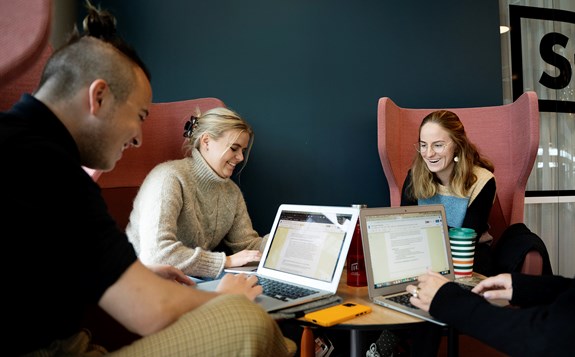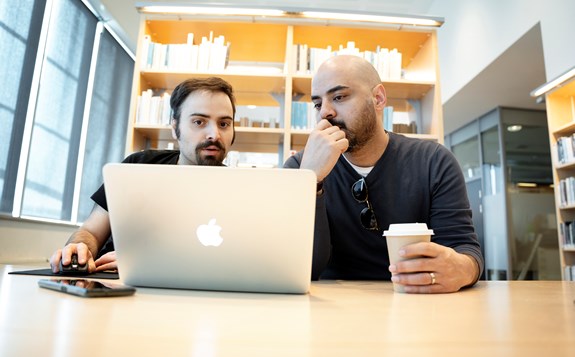We use cookies on this website. Cookies help us deliver the best experience on our website. Read about cookies.
-
- Student Services
- Student Services
-
- The Writing Centre and support for your studies
- The Writing Centre and support for your studies
- Take-home exams and written assignments
- Registration, certificates & administration
- Student Health Service
- Study Guidance
-
- Studying with a disability
- Studying with a disability
- Become a support person
On the page -
- Jobs and internships
- Jobs and internships
-
- Innovation and entrepreneurship
- Innovation and entrepreneurship
- Leapfrogs
- Internship
- Your future career
- Graduation and alumni network
On the page
Registration, certificates & administration
and administration
See your study results and credits, find your syllabus and register for courses. These are some of the services that you can do yourself in Ladok for students or the Form Store. You will also get help from the Student Administration during your study period.
You can do the following things in Ladok for students:
- see your study results and registered credits
- register for courses
- download verifiable course certificates
- update your contact information
Log in with your computer ID (student account) and password.
All certificates that you download yourself in Ladok are verifiable. This means that you do not need a signature or stamp by an employee at the university to verify that the certificate is valid.
Each certificate has a unique code and a link to a verification site. The person or company to whom you send the certificate uses that information to verify that the certificate is legitimate.
You log in to Ladok for students with your computer ID. If you do not yet have a computer ID from Malmö University, you can use your login information from Universityadmissions.se
Log in with your computer ID (student account) and password.
If your computer ID is inactive, select "Ladok for alumni" and log in with Freja eID.
Upgrade your computer identity to be able to use Ladok for students
You must upgrade the assurance level of your computer identity to be able to log into Ladok for students. Please note that only students with a Swedish personal identity number must upgrade the assurance level of their computer identity.
Temporary personal number
If you have had a temporary personal number but have received a Swedish personal identity number from the Swedish Tax Agency, you need to announce the new number in order for it to be changed.
Please email ladok@mau.se. The update is then transferred to Canvas and Kronox.
Order transcripts and certificates from the university
You can order a transcript of records or a certificate of registration electronically signed by an administrator at the university.
Keep in mind that it takes some time to process your order. The fastest way for students and alumni to get a verified certificate is to log into Ladok and download it. You will find more information on how to do this on this page.
If you have any questions regarding the order of transcripts and certificates, contact us by using our contact form.
You can do the following things in the Form Store:
- apply for withdrawal from studies
- leave from studies
- deferment of study commencement
- admission to a later part of a programme
Get support from a student administrator
The Student Administration will help you with the practicalities during your studies.
We can help you with questions regarding:
- registration
- roll call
- registration certificate
- admission from waiting list
- application for course certificate
- recognition of previous studies
Contact us by using our web form. Please include the name of your course or programme, and we'll make sure your question reaches the right person at the University.
If you are a new student, you can see which faculty your education belongs to in the welcome email from your faculty/department. You can also see this information on the programme's page in the education directory.
Visit the Student Administration
The Student Administration at the Faculty of Culture and Society has an information desk on floor 2B at Niagara. The information desk is open on Tuesdays and Thursdays 10–14.
Student Administration at the Faculty of Education and Society
You can always use our contact form to get in touch with the appropriate student administrator.
Contact Heléne Henriksson for questions related to:
- Education: Educational Theory, Master's programme
- Courses at the Department of Childhood, Education and Society
Contact Paola Mendoza Frödin for questions related to:
- Sport Sciences: Sport in Society, Master's Programme
- Courses at the Department of Sport Sciences
Contact Anita Marttila for questions related to:
- Teaching and Learning in Higher Education, Master's Programme
- Courses at the Centre for Teaching and Learning
Contact Rebecka Sundin for questions related to:
- Courses at the Department of Culture, Languages and Media
Contact Monica Lotfinia for questions related to:
- English and Education: Master's programme
- Courses at the Department of Natural Science, Mathematics and Society
- Courses at the Department of Society, Culture and Identity
- Courses at the Department of School Development and Leadership
Find your syllabus
Syllabi for previous and ongoing programmes can be found in the education directory. In the syllabus, you can also see the course list for your programme.
Credit transfer
You can apply for a credit transfer if you have previously studied courses at university which you think corresponds to courses in the programme you are admitted to. Other training and professional practice may also have provided you with relevant knowledge that can be recognised as a credit transfer. No credit transfers are assessed or guaranteed in advance.
When to apply for credit transfer
The application for credit transfer can be made once you have been admitted to a course/programme and have accepted the offer.
How to apply
Follow the steps below to apply for credit transfer. The following information applies to students at all faculties apart from the Faculty of Odontology.
- Make your own assessment of your knowledge and skills in relation to the requirements set for the course you wish credits to be transferred to (the course/programme at Malmö University where you are now a student).
- You must make your assessment based on the intended learning outcomes of the course. The description in the course syllabus of content, course literature. An assessment of students’ performance in the course is also valuable information for you before you apply.
Find course and programme syllabi here
- If you consider that your knowledge and skill is consistent with the course requirements, go on with your application and fill in the form.
- Remember to apply in good time before the course starts. The processing time may vary but assume it can take at least four weeks to get a decision, or sometimes longer. Assessing applications that refer to other education and/or activities involves a more comprehensive validation process and can therefore take considerably longer.
- Remember that a decision on the transfer of credits means that you must be a registered student at Malmö University.
Note that a decision on credit transfer does not equal guaranteed admission to a course, course component, or programme.
What previous studies do I need to/not need to credit transfer?
Sometimes, previous studies are taken directly into the degree, but sometimes they have to be credit transferred to be able to be included in the intended degree you are studying towards. All cases are individual, but there are some important differences:
Example of when a credit transfer is necessary: if you do not want to take a course within your programme because you took a course before with the same content.
Example of when a credit transfer is not necessary: earlier studies at a Swedish university that correspond to an optional semester in your programme: courses that you took at other Swedish universities that you want to include in a general qualification or as an optional semester in your programme. When you apply for a degree via “Ladok Student”, you mark which courses, in addition to the courses you took at Malmö University, that are to be included in the degree.
Grades with credit transfer
You do not receive a grade on a credit transferred course or course component since no new examination of your knowledge has been done (only “TG” is noted). In the transfer of foreign qualifications, only credits are transferred in Ladok; they are not graded.
A decision of credit transfer can not be undone
When a course has been completed through a credit transfer, you can not register for the course or study it at a later date. A decision on credit can also not be undone if it is already registered in Ladok.
Tuition fee reduction
A reduction of the tuition fee (in the form of a partial refund) due to a credit transfer is possible if the transferred credits are more than 15 credits.
Student finance with credit transfer
An approved/partially approved credit transfer can affect your student finance and you must check with the Swedish Board of Student Finance, CSN, for what applies to you. If your credit transfer means that you take fewer credits one semester than the student finance you have applied for, you must report all changes to CSN.
You need to submit documents together with your application that verify your earlier studies or previous professional activities. Note: Provide appendix numbers on the form in the respective line on the form.
From previous studies
You can apply for credit transfer from earlier education, both university education and other studies.
For previous university studies
From university studies outside Sweden:
- Official Transcript of Records. The transcript must be attested*, preferably by the issuing university. Information on the university, course name, the date for completed studies, level, credits and grade should be indicated.
- Information on the university’s education- and grading system, if it is not clear from the transcript.
- Formal course syllabus that was relevant when you took the course.
- list of course literature, that was relevant when you took the course.
* What is meant by attestation? This means that a person must sign, write his or her name in block letters and phone number on each copy. The person who thereby certifies that the copy matches the original can be a private person or an authority official. You can ask a staff member at Malmö University to make an attested copy from your original document and submit that instead.
From Swedish universities:
- Previous higher education must be authenticated with transcripts and certificates from LADOK or course or exam certificates. Course codes and names must be stated.
- Documents that state the intended learning outcomes and describe the content of the education must be attached, for example course syllabus with literature list that applied when the course was taken.
For other education
Education other than at university must be authenticated with documents such as educational certificates or course certificates. Usually, descriptive information about the education is also required, such as its content, intended learning outcomes, scope and educational level.
If you have documents from other countries
Note: Documents from university studies that are issued in a language other than Swedish, English, Danish or Norwegian must be translated into Swedish or English by an authorised translator.
Upper-secondary documents in English, French, Spanish, German, Danish and Norwegian do not need to be translated. Certificates in Icelandic and Finnish also do not need to be translated, but other documents, such as certificates of a name change must be translated by an authorised translator. It is you as the applicant who arranges translations and bears any costs for translation if necessary.
For experience-based learning – Professional activities
To illustrate knowledge that has been obtained through other contexts, such as professional experience, your own very clear and comprehensive description is required. Write in a regular Word document. You must explain:
- what knowledge and skills you developed, in relation to the intended learning outcomes of the course you wish credits to be transferred to
- what you did - i.e. what experiences caused you to develop this knowledge and skills, such as what professional duties you had
- during what period(s) of time
- scope, e.g. percentage of full-time
- responsibility - your position/role
Describe situations and challenges that you encountered in professional activities and/or other activities where you acquired and developed your knowledge and skills.
- How you resolved the situations and what you based your actions on.
- Describe and justify the choice of methods/aids/tools and/or equipment you used to resolve the situations described and the results.
- Give examples of alternative actions/solutions/perspectives to resolve the situations/challenges/problems described
- Feel free to link your description to relevant theory.
Documentation that may need to be attached to your application includes, for example:
- employment certification including the extent of the work in time (percentage of full-time) and time period
- description of duties and responsibilities
- reference to immediate manager
- other documents that you wish to refer to.
The same applies to learning in activities other than professional activities.
The more verification there is for what you describe, the easier the assessment process is. Feel free to contact the study and career adviser at your faculty prior to applying.
Note that you submit one form for each course at the university that you are applying for credit transfer to be applied to. The form with all appended documentation is to be sent to the registrar and the address is on the application form.
Faculty of Culture and Society application form
Faculty of Technology and Society application form
Faculty of Health and Society application form
Faculty of Education and Society application form
Note that the university makes its assessment based on what you have provided in your application. Material that is not verified/authenticated, copies that are not attested etc. have no significance in the assessment of your knowledge and skills, but can provide information about education that you otherwise have attested certificates for.
Assessment and decision
Here, you can find information on how your application is assessed and how to interpret the decision on your application.
The university’s assessment of an application for transfer of credits is based on:
- Qualifications from higher education (course certificate/exam certificate/transcripts and certificates or equivalent together with course syllabuses),
- Qualifications from other education (certificates etc. together with information about the education/course syllabuses or similar),
- Description of your knowledge and skills in relation to the course requirements in addition to what can be authenticated through educational qualifications, so-called experienced-based learning from a professional position, for example.
For credit transfer we review the content, scope, level and learning objectives of your earlier studies/professional practice against the course syllabus you are applying to receive credit for (meaning the course that you do not want to take given the credit transfer). If your credit transfer is approved, it means that you do not need to take those specific components of the programme. Note that no credit transfers are assessed or guaranteed in advance.
For students at the Faculty of Culture and Society and Technology and Society
Administrators at your department/faculty review your application. The course coordinator/examiner for the part of the course you are applying to have credit transferred for from your earlier studies/professional practice makes a decision on your application. The decision is then sent to you from the administrator at your department/faculty. If your application concerns an optional semester or a whole course, it is the head of department that makes a decision on your application.
After the application has been reviewed, you receive a decision by email. There are three different decisions on a credit transfer application that you can read more about below.
- Approved: Approved means that your application was approved. The decision also states which of your earlier studies/earlier professional practice forms the basis for the decision.
- Partially denied: If a part, but not your whole application was approved, you receive a partial denial. The decision then contains information on what component of the course you applied to have credit transferred for is met, and a justification for why the remainder could not be approved.
- Denied: Denied means that your application could not be approved, either entirely or partially.
Note that a credit transfer of part of a course cannot always be entered into Ladok directly. This is the case, for example, if the course will be held in a later semester.
Appeals
If you are not satisfied with the decision you received, you can appeal it. An appeal must be made to the Higher Education Appeals Board, but is always sent to Malmö University. You have three weeks from the date you received the decision to send in your appeal.
More information on how to appeal a decision will be provided when the decision is sent to you.


